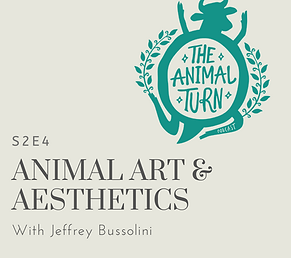Season 2: Animals and Experience
In Season 2 of the Animal Turn, Claudia speaks to scholars from philosophy, sociology, ecology, and geography about useful concepts for understanding animals and their experiences.
Some of the key themes to emerge from the discussions are the tensions between individuals and groups, how experience can be used to understand social relations and animal culture, as well as the usefulness and challenges of thinking with animals' sensory experiences. This season is theoretically dense and provides a useful baseline for contemplating, thoughtfully, about the ways in which animals experience the world and what the implications are of that.
The concepts include: Phenomenology, cognitive ethology, culture, art and aesthetics, intimate geography, interspecies subjectivity, political multispecies communities, shoalmates, and survivors. As always the season ends with a grad review discussing the key themes of the season.

.png)
.png)


_p.png)
.png)
.png)
.png)

.png)